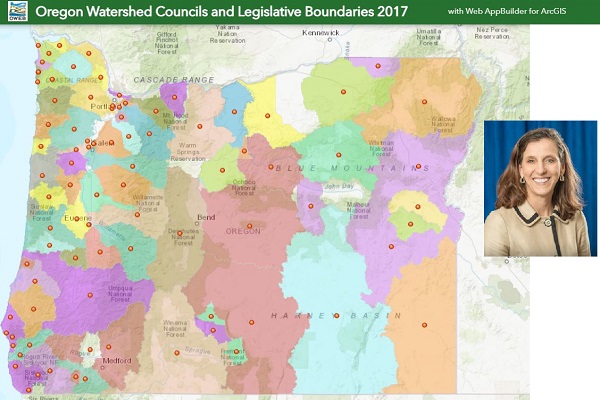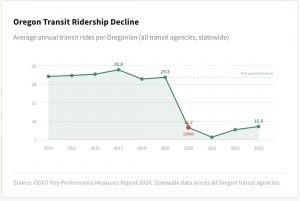Ahead of governor election, many state agencies are experiencing change and loss
6 min read
Lisa Hanson: For the record, Lisa Hanson, executive director.
[00:00:02] John Q: Prepare for a lot of big changes in state government. At the Oregon Watershed Enhancement Board in late July, Lisa Hanson.
[00:00:10] Lisa Hanson: One of the things I wanted to mention in terms of state government right now, the one word I’m going to tell you is going on is ‘Change.’
[00:00:17] We’re getting close to a governor’s transition. We’re seeing a lot of changes in state agency heads. Alexis Taylor, director of agriculture, has been nominated to USDA. Colette Peters, who is an amazing leader in Oregon government over the Department of Corrections, is going to the federal corrections system. Richard Whitman has announced his retirement as director of the Department of Environmental Quality, a huge loss to the state of Oregon, in terms of his knowledge, his knowledge that he had at the Department of Justice as a lead natural resource attorney, and then leading DEQ and really putting DEQ in an amazing space.
[00:00:52] And one that I have to tell you is incredibly near and dear to my heart, because she has been an amazing mentor to me, inspiration and made the world my oyster when I was at the Department of Agriculture, is Katy Coba. Katy Coba has just recently announced her retirement, I think Oct. 1 is the date, and it is a tremendous loss to Oregon in terms of state government and the leadership and the vision and the energy that she has provided.
[00:01:21] Not only, I mean, she has 40 years, 37 years experience in state government. It’s tremendous, right? Starting out working as a budget analyst at DAS, working on the governor’s staff during the first Kitzhaber administration, working in economic development, coming to the Department of Agriculture for 13 years and being the longest-serving Department of Agriculture director.
And then moving on to lead, to be the state CEO. And her vision and what she’s done for bringing the agencies together and the enterprise vision is nothing but phenomenal and leading us through COVID. I can’t tell you the admiration I have for her as a person and a friend and a mentor. And so it’s just a tremendous loss to state government.
[00:02:01] The other one that I would mention to you, he was a personal friend of mine as well, former Director Jim Rue passed last week after a very short battle with cancer. And his vision throughout the time I worked with him on the Board of Agriculture, when he first came back to Oregon and then his time at DLCD as the deputy, and then as the directorhe put his life work into caring for the lands and the importance of Oregon’s land use system and what it could do in terms of climate.
[00:02:31] And at a recent meeting where the board adopted the climate rules, I think that represented a reflection of who Jim was and what he brought to the state of Oregon and his service. And so, you know, I hope that we all have a chance to reflect and, are grateful for all of that and just acknowledge the years of service and knowledge that we’re seeing transition out. These are amazing people that have committed to Oregon over time.
[00:02:57] So that’s my acknowledgement to the change that’s going on. There will be a lot more over the next several months as things move on, but there are amazing people I’m sure will come in, but they’re big shoes to fill in many of these places that have just been incredible Oregon leaders.
[00:03:12] John Q: She was asked about the emergency grants. OWEB Executive Director Lisa Hanson.
[00:03:17] Lisa Hanson: They’re starting to hit the ground. We’ve had several of the grants go out. We did have a a bump in trying to get the money out for irrigation efficiency. And I think we found a way to work through it. There’s nothing that a piece of paper can’t fix that another piece of paper created, and we’ve done a lot of collaborative work and conversations, to get to a spot, meeting the vision of the legislature to get the money out with the intent of the conservation work and long-term water savings in place.
[00:03:44] One of the things that we’ve learned in terms of the emergency funding is that there has been a desire, we want to get it out on the ground, but we also have learned, especially in terms of fire, those local organizations aren’t ready to receive it. They aren’t ready to apply for it. There’s a span of time in between that they are just in community recovery. And community recovery has to take place before they start thinking about the restoration work on the ground.
[00:04:11] And so we’re just now, I think, second cycle, feeling like, ‘Okay, we’re going to get it out.’ There was a little bit of nervousness first cycle of the recovery grants with what we had for responses and it’s readiness and it’s resources. Oregon puts so much value on using local organizations to do the work, but local organizations have to have capacity. In this case, local organizations have to have capacity and they also have to recover from crisis. And the last couple of years have been compounded crisis. So working through that and I say ‘Patience and grace’ a lot. These are the reasons.
[00:04:49] Patience and grace, we’re going to get there and people are coming with. It’s work and time and a lot of collaboration and a lot of conversations and trying to figure out how we work back and forth to help them along.
[00:05:00] John Q: They also met with the FFA and the Black Oregon Land Trust (BOLT).
[00:05:04] Lisa Hanson: You’ve heard about the concerted effort in terms of building relationships and connecting people and connecting people with other people for longer linkages. Recently in one of the communities they were talking about bringing youth into conservation work, a connection with Oregon FFA Association and thinking about how Oregon FFA Association could create supervised leadership.
[00:05:27] BOLT. When we met with BOLT a couple weeks ago, that, how do we get urban, agricultural interest? How do we bring in some of that education to natural resources into those urbans. So we’re taking the background and the network that we have and bringing them into the community conversations to make stronger linkages.
[00:05:45] We at OWEB are incredibly proud of this. We have been working really hard at making our meetings more accessible to the public to provide transparency and inclusivity. We’re committed to that transparency and having more people have the opportunity to listen in and work with us.
I’m just going to say this: ‘Social media presence.’ If you haven’t liked us on Facebook, if you haven’t liked us on Instagram, just do it, because the pictures are beautiful and I need you to share them out to your friends. It really highlights the work of the partners. And if you don’t understand OWEB, it will excite people about the work and it excite them about conservation and the natural world.
[00:06:25] John Q: Coming attractions include the new budget narrative.
[00:06:30] Lisa Hanson: I am very excited about this document, completely overhauling our agency request budget in terms of the narrative to really think about plain language, to create a story of where we’re at today with OWEB, the challenges that we’re facing with OWEB and the vision of where the board and the staff want to go in terms of next steps and what we need to get there.
[00:06:56] This is nothing I would normally share with the board because it’s big and it’s thick, but it’s worth having the opportunity to see the narrative, and I think just acknowledge the volume of work that has gone into to it in terms of time and thought, in trying to tell a new story about where we’re at today, because a lot of things have changed.
[00:07:19] John Q: Coming in October at OWEB’s next quarterly meeting, a discussion of Klamath dam removal.
[00:07:24] Lisa Hanson: Director Whitman from DEQ has requested time with the board to talk about Klamath dam removal, and the need for some funding for restoration work, when all of that takes place.






